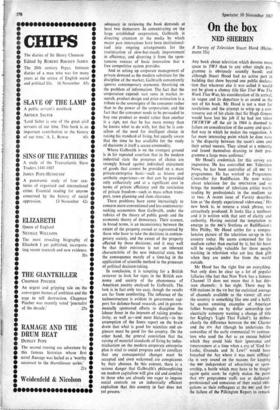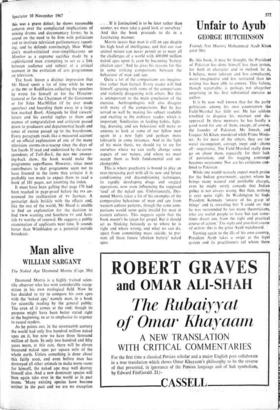On the box
NED SHERRIN Any book about television which devotes more space to TW3 than to any other single pro- gramme is obviously soundly based; and although Stuart Hood had no active part in building that show beyond one public declara- tion that whatever else it was called it would not be given a clumsy title like That Was The Week That Was, his consideration of its arrival, its vogue and its departure is as sound as the rest of his book. Mr Hood is not a man for revelations and the attempt to whip up a con- troversy out of his claim that Sir Hugh Greene would have lost his job if he had not taken TWTWTW off the air in 1964 is doomed to failure on consideration of the canny and quali- fied way in which he makes the suggestion. A far more interesting point which he does raise is 'the disparity between the team's aims and their actual success. They aimed at a minority and found themselves drawing to their pro- gramme a large mass audience.'
Mr Hood's credentials for this survey are impressive. He has controlled BBC Television News, he has been controller of all BBC TV programmes. He has worked as Programme Controller for Rediffusion. He now writes about television for the SPECTATOR and so brings the number of television critics worth reading by professionals in the medium up to two. A recent issue of Variety describes him as 'the deeply experienced video-exec.' His new book is, to reverse a stock phrase, not attractively produced. It looks like a textbook and it is written with that sort of clarity and authority. Having resisted the temptation to emerge as the BBC's Svetlana or Rediffusion's Mrs Philby, Mr Hood settles for a compre- hensive picture of the television set-up in this country today. He seems concerned for the medium rather than excited by it, but his book will be especially valuable for those people working in television who are less than glib when they are under fire from the world outside.
Mr Hood has the right line on everything. Not only does he clear up a lot of popular fallacies (the fact that New York has a famous Channel 13 does not mean that it has thir- teen channels; it has eight. There may be 630 stations in the US but the statistical average of channels available to the viewer all over the country is something like one and a half); he quotes amusing examples of American follies brought on by dollar censorship (an electricity company wanting a change of title for Kipling's 'Light That Failed'); he defines clearly the difference between the BBC Charter and the av Act (though he underrates the cowardice of the early commercial -rv contrac- tors who used the Act as an excuse behind which they could hide their ignorance and timorousness at a time when a cry of 'God for Leslie, Granada and St Lew!' would have breached the Act where it was most stifling); he is very sound on the reasons for keeping the BBC independent of advertising or spon- sorship, a battle which may have to be fought again quite soon; he rightly makes the point that 'Tv programme staffs are as dedicated, professional and conscious of their social obli- gations as their colleagues at the BBC and that the failure of the Pilkington Report to remark
this was a grave defect; he shows reasonable concern over the complicated implications of mixing drama and documentary forms; he is sound on the need to be firm with politicians and to institute television parliamentary report- ing; and he defends convincingly Huw Whel-
don's much-criticised over-simplifications on Monitor as a supreme sacrifice made by a
sophisticated man attempting to act as a link between audience and subject at a critical moment in the evolution of arts programmes on television.
The book leaves a distinct impression that Mr Hood spent a lot of time while he was
at the BBC or Rediffusion collecting the speeches
he wrote for himself or for the Director- General or for the Chairman of the Governors
or for John MacMillan (if he ever made speeches) and hoarding them away in a large box marked Book. Alongside he filed viewers' letters and his careful replies to them and memos of congratulation and criticism passed down to producers and departmental heads and notes of excuse passed up to the boardroom. Every paragraph reads like a measured account of an official explanation of one of the many television storms-in-a-teacup since the days of Ian Jacob. If read and understood by the corre- spondents of Talk-Back, the new BBC answer- ing-back show, the book Would make the programme superfluous. However, since most contributors to that programme seem not to have listened to the items they criticise it is probably too much to expect them to read a book 9f 181 pages, not counting the index.
It must have been galling that page 176 had been reached in page-proof before the ITA an- nounced the reallocation of TV licences. A postscript deals briskly with the effects and, like the rest of the world, Mr Hood is unable to find an explanation for the decision to find 'rww wanting and Southern TN' and Scot- tish Tv worthy of renewal. He suggests a public examination of applicants next time. It sounds better than Wimbledon as a potential outside broadcast.







































 Previous page
Previous page